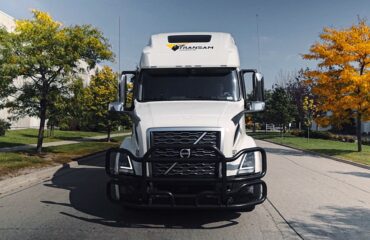As we celebrate Women’s History Month in March 2024, it’s the perfect time to highlight the transformative and increasingly pivotal role women are playing across various facets of the trucking industry. Traditionally viewed as a male-dominated field, the sector is witnessing a significant paradigm shift. From driving rigs across long stretches of road to managing logistics behind the scenes, women are not just filling roles; they’re redefining them and, in the process, shaping the future of trucking.
A journey through time
The history of women in trucking dates back to the early 20th century, though their contributions were often overlooked or minimized in the industry’s early days. The first women to enter the trucking industry faced significant challenges, including societal norms that were largely against women working in such roles, legal barriers, and a lack of support from within the industry itself.
One of the pioneering figures in trucking was Lillie Elizabeth McGee Drennan, who is widely recognized as the first woman to receive a commercial truck driver’s license. Drennan obtained her commercial license in the 1920s in the state of Texas and went on to own and operate the Drennan Truck Line with her husband. Despite facing discrimination and challenges, including attempts to revoke her license over unfounded concerns about her safety as a female driver, Drennan maintained an exemplary driving record. She was known for her strict standards for safety and her hands-on approach to running her business, even during the challenging times of the Great Depression.


Lillie Drennan and others like her paved the way for future generations of women in the trucking industry. However, it wasn’t until the latter half of the 20th century that more significant numbers of women began entering the field, supported by broader social changes and movements for gender equality in the workplace.
Barriers for women in trucking
Women entering the trucking industry face significant barriers, notably gender bias and stereotyping. This pervasive issue paints trucking as a male-dominated field, discouraging women from pursuing careers and often leading to discrimination. Such societal perceptions create an unwelcoming environment, affecting hiring practices and daily job interactions.
Another major concern for women in trucking is safety. Traveling alone and stopping in remote locations can pose risks, heightening worries about personal security. Additionally, the industry’s long hours and time away from home challenge work-life balance, particularly for those with family responsibilities. The lack of facilities catering to women’s needs at rest stops further complicates their experience.
Access to tailored training and mentorship is also a hurdle. Despite more women joining the industry, finding programs that address their unique challenges remains difficult. This scarcity of resources can impede women’s entry and advancement in trucking, perpetuating underrepresentation and limiting the industry’s potential for diversity and innovation.
Impact and innovation
As societal perceptions have shifted towards embracing diversity and inclusivity, so too has the landscape of the trucking industry. Women in trucking are now key players in every aspect of the industry. Women are driving innovation and change in trucking, leading to safer roads, more efficient operations, and a more inclusive workplace culture. The diverse skills and perspectives that women bring to the table are invaluable assets in tackling the industry’s most pressing challenges.
Women truckers are often recognized for their exceptional safety records, demonstrating a cautious approach to driving that results in fewer accidents and violations compared to their male counterparts. This conscientiousness on the road can lead to significant benefits for employers, including lower insurance costs and enhanced overall safety. Beyond their commendable safety practices, women are also lauded for their meticulous attention to detail, an attribute that proves invaluable in trucking for tasks such as maintaining accurate logs, conducting thorough vehicle inspections, and adhering strictly to safety and regulatory protocols.
Moreover, the strong communication skills that many women possess can greatly enhance operational efficiency and teamwork within the trucking industry. Effective communication is crucial for resolving conflicts, ensuring smooth interactions with dispatchers, clients, and fellow drivers, and providing top-notch customer service. Additionally, women’s natural empathy and adaptability can be a boon in customer-facing roles and in situations that require quick, creative problem-solving. The resilience and perseverance women display by entering and thriving in a traditionally male-dominated field like trucking also underscore their capacity to tackle challenges head-on, making them invaluable assets to the trucking workforce.

Overcoming challenges
Despite the progress, challenges remain. Women in trucking still face issues related to gender bias, safety concerns, and achieving a work-life balance. Addressing these challenges head-on is crucial for sustaining the momentum and ensuring that the trucking industry continues to be an attractive and viable option for women.
Organizations such as the Women’s Trucking Federation of Canada (WTFC) or Women In Trucking (WIT, US) are at the forefront of advocating for women’s rights and opportunities in the industry, highlighting the importance of solidarity and support among women in trucking roles.
The road ahead
As we reflect on Women’s History Month, the story of women in trucking is a powerful reminder of the strides we’ve made towards gender equality and the work that still lies ahead. The rise of women in trucking is a beacon of progress, not only for the industry but for society at large.
The future of trucking is undoubtedly inclusive, with women continuing to break barriers, shape the industry, and pave the way for generations to come. It’s a journey of resilience, innovation, and transformation that we all play a part in advancing. Let’s celebrate the achievements of women in trucking this month and support their continued success in the years ahead.
To learn more about Transam Carriers’ transportation services, please visit our page: https://www.transamcarriers.com/services
For career opportunities at Transam Carriers, visit our Careers page or email us: [email protected]




